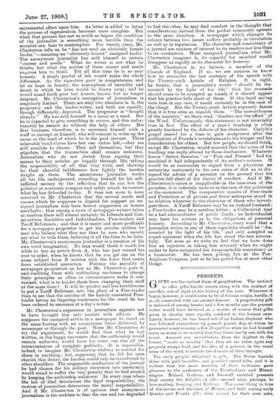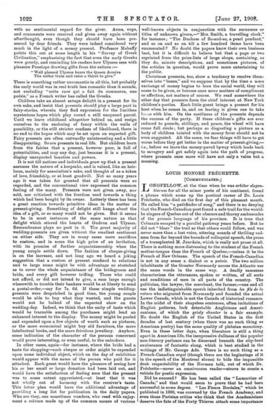PRESENTS.
GIFTS are the earliest form of propitiation. The instinct to offer gifts has its source along with the instinct of sacrifice, out of sight in the history of the race. Wherever it began, however, it would seem to be Of human origin, hardly, if at all, connected with our animal descent. A propitiatory gift is unheard of among beasts, and it few months ago the present writer would have declared as a matter of course that gifts given in charity were equally confined to the human race. Lately, however, he has heard tell of un Indian elephant who was followed everywhere by a.stnall pariah dog, to whom be presented every evening a few chupatties when be had himself eaten as ntany as Ile wanted, handing them one by one with his trunk. Animals are, nevertheless, from the highest to the lowest, "made so straitly" that they set no value upon any property except food, and the idea of a present, in the usual
sense of the word, is outside the domain of their thought. •
The early peoples delighted in gifts. The Norse legends shine with gold bracelets and jewelle4 sword-hilts, and it is evident that the mere mention of their brilliance gave• pleasure to the audiences of the Troubadours and Minna- singers. Roland, Gudrun, and Beowulf counted presents high • among the delights of life,—second only. perhaps, to love-making, feasting, and fightitrz. The sante thing is true of the heroes and heroines of Homer, and both among. early Greeks and Franks gifts were valued for their own sake.
with no sentimental regard for the giver. Arms, cups, and ornaments were received and given away again without afterthought, even though they should have been pre- sented by dear friends. They were indeed considered very much in the light of a money present. Professor Mahaffy points this out at some length in his "Survey of Greek Civilisation," emphasising the fact that even the early Greeks were greedy, and reminding his readers how Ulysses sees with pleasure Penelope drawing gifts from the suitors :— "Well pleased Ulysses hears the Queen deceive The suitor train and raise a thirst to give."
There is something rather unromantic in all this, but probably the early world was in real truth less romantic than it sounds, not excluding " cette race qui a fait du commerce, une poesie," as a French writer has called the Greeks.
Children take an almost savage delight in a present for its own sake, and insist that presents should play a large part in fairy-stories, wherein they find expression for the limitless mysterious hopes which play round a still unopened parcel. Until we leave childhood altogether behind us, and resign ourselves to the enclosing of fancy within the walls of possibility, or the still stricter confines of likelihood, there is no end to the hopes which may be set upon an expected gift. Fairy presents are often outwardly uninteresting and a little disappointing. So are presents in real life. But children learn from the fairies that a present, however poor, is full of potentialities, and may any day, just because it is a present, display unexpected beauties and powers.
It is not till nations and individuals grow up that a present assumes the nature of a keepsake, and is valued, like an heir- loom, mainly for association's sake, and thought of as a token of love, friendship, or at least goodwill. Not so many years ago it was taken for granted that all presents were so regarded, and the conventional view expressed the common feeling of the many. Presents were not given away, nor sold, nor criticised with the freedom used towards a thing which had been bought by its owner. Latterly there has been a great reaction towards primitive ideas in the matter of present-giving. Something of delight still hangs about the idea of a gift, or so many would not be given. But it seems to be in most instances of the same nature as that delight which stirred the hearts of Gudrun and Ulysses. Remembrance plays no part in it. The great majority of wedding-presents are given without the smallest sentiment on either side. They are in many cases mere sacrifices to custom, and in some the high price of an invitation, with its promise of further acquaintanceship when the young couple settle down. The fashion of cheque-giving is on the increase, and not long ago we heard a joking suggestion that a custom at present confined to relations and to large sums might be with advantage so stretched as to cover the whole acquaintance of the bridegroom and bride, and every gift however trifling. Those who could not afford, or did not intend to give, a sum large enough wherewith to trouble their bankers would be at liberty to send postal-order,--say for 7s. 6d. If these 'simple wedding. presents were despatched in good time, the young couple would be able to buy what they wanted, and the guests would not be balked of the expected show on the wedding-day. Indeed, we think that the unity of taste which would be traceable among the purchases might lend an enhanced interest to the display. The money might be pooled and expended upon a few objects of worth such as pictures, or the more economical might buy old furniture, the more intellectual books, and the more frivolous jewellery. Anyhow, some indication of the character of the persons concerned would prove interesting, or even useful, to the onlookers.
In other cases, again—for instance, where the bride had a taste for shopping—each cheque or order might be expended upon some individual object, which on the day of exhibition would appear with the name of the person who paid for it attached. Each guest would have the pleasure of seeing how his or her small or large donation had been laid out, and would have the satisfaction of feeling sure that the present was to some extent appreciated,—at least that it was not wholly out of harmony with the receiver's taste. This latter plan would have the additional advantage of providing a long list for publication in the daily papers. Who are they, one sometimes wonders, who read with enjoy- inent a column made up of the common names of various well-known objects in conjunction with the surnames or titles of unknown givers,—" Mrs. Smith, a travelling clock," for instance ; "The Duchess of So-and-so, a pearl pendant," and so on and so on till a few hundred items have been enumerated ? No doubt the papers know their own business best, but it is difficult to believe but that a page or two reprinted from the price-lists of large shops, containing, as they do, minute descriptions, and sometimes pictures, of the articles in question, would prove more entertaining to the public.
Christmas presents, too, show a tendency to resolve them- selves into "boxes," and we suppose that by the time a mere exchange of money begins to bore the social world, they will cease to be given, or become once more matters of compliment or affection, not matters of course. We read somewhere the other day that presents form the chief interest at New York children's parties. Each little guest brings a present for his host when he comes in, and on leaving is given one to take liome with him. On the costliness of the presents depends the success of the party. If these children's gifts are ever reduced to pounds, shillings, and pence, the wheel will have come full circle ; but perhaps so disgusting a picture as a body of children tainted with the money fever should not be even suggested. All the same, we fear things will have to get worse before they get better in the matter of present-giving,— i.e., before we leave the money-paved byway which leads back to savagery and get safely again into the path of progress, where presents once more will have not only a value but a meaning.























































 Previous page
Previous page